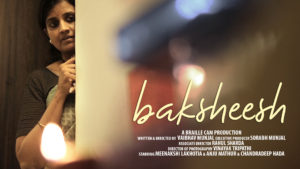
India Independent Short Film Review “Baksheesh”
WATCH THE FILM HERE
First, the Recap:
Is there not an inherent power in the willingness to give? The ability to donate our time, skills, money, or anything else that might benefit the lives of others is an art sometimes lost in a world that seems more bent on self-indulgence and personal profit rather than overall wellness of our fellow human beings. More so, when we perhaps find ourselves even to the point of doubting our faith for provision, what doors can it open if we’d instead just believe? It is the midst of India’s New Year celebration, Diwali. In one household, like many, a father (Chandradeep Hada), a mother (Anju Mather), and their son Rohan (Roshan Lal), are all preparing for the Diwali pooja.
Yet, even as the somewhat mildly chaotic goings on in the home transpire, there is a conversation via phone overheard that Roshan’s mother is having which involves a tiny lament about gifts being exchanged and perhaps even a level of aggravated disappointment that one was not the equal to the other. Yet, even as the din of celebratory fireworks begins to dissipate outside, the home’s door is left open, allowing ideally for their prayers and offerings to Lakshmi to be heeded and for her to therefore enter and bless their residence and those within. However, even as the ceremony commences, a woman (Meenakshi Lakhotia) quietly appears and initiates a purposeful and poignant moment that will not only affect Roshan and his family, but another life even more stirringly.
Next, my Mind:
It takes just a little over three minutes of runtime and, at least for this U.S.-based critic, a few extra ticks of the clock to look up some facts for the sake of context to completely enjoy and be totally moved yet again by Indian independent cinema thanks to writer/director Vaibhav Munjal and executive producer Sorabh Munjal. An effective, albeit abbreviated, exploration of a myriad of thematic paths which cover the concepts of being thankful for what we have, unconditional giving, the beauty of unexpected blessing, providing for those less fortunate, and being open to give rather than receive while also, in more subtle ways, ideas about our sense of entitlement and the need for us to cease complaining when things don’t always go like we wish, the narrative illustrates that bond of family, an overall attitude of joy, and the wonderfully affecting results of things we may not witness directly, but have such powerful reverberations.
Much of this may very well be by conjecture, but no less important to be pointed out in efforts like this, as the film certainly strives to remind us that sometimes, even having just that little iota of belief and accompanying happiness can bring about farther reaching ramifications for the betterment of not just us, but for others as well, and the means by which this is portrayed here really struck my heart. All of it is likewise that bit of a reality check, bringing to mind perhaps how many times we do find it easier to gripe about that which we don’t have instead of releasing it to our faith and trusting that everything has a reason and will ultimately work out for the best, even if that entails the benefit going to enrich the lives of someone else and not necessarily us. It’s so often hard to see this enacted around us, residing in a current world so full of hate and anger, yet this should never be a deterrent to us aiming to achieve a lasting goal to help each other in any ways possible and comprehend that little irritations are not worthy of our losing sight of needed truths.
Visually, the effort remains uncomplicated and clean, depicting the characters and events with intent and unobtrusive clarity. This can also be said for the whole of the totally Jaipur-based cast who work fluidly together as one cohesive ensemble in order to bring out the larger thematic designs being presented. Mathur brings a veteran, regional T.V.-based acting maturity to her role as the mother, a woman of strong but loving nature who becomes one of the primary catalysts for the film’s grander messages as hinted at earlier in my review. Hada also brings small screen experience as well as stage performance background to his role as the father, a devout man more than bent on ensuring he and his family take part in the Diwali pooja while attempting to maintain some semblance of decorum in the home while doing so. Lal comes fresh off another of Munjal’s short film efforts, “Fare-Thee-Well”, to make his mark on this effort as the family’s son Roshan, a typical teenager trying to be what his parents expect while perhaps exercising a minute bit of standard teenage dilly-dallying. Finally there is Lakhotia, playing the enigmatic, though initially unassuming, woman who plays a key part in the events that gives the film its final emotional punch through her actions.
Additional turns are present here from Shravan Kumar Shastri, Arpit Tiwari, and Prabhakar Shastri as well. In total, yet again proving what can be accomplished in short (film) order with the right combination of solid writing, pertinent messages, great acting, high production value, and intelligent directing, “Baksheesh” is a pleasantly charming character drama that serves to remind us about those facets of daily choices we can make to help create a better world while prompting us to remember what’s truly important and worth being thankful for, all while letting faith be our guide and making the effort to positively touch other people’s lives, even when we might not realize it.
As always, this is all for your consideration and comment. Until next time, thank you for reading!




